|
The 76th Geneva
Motor Shows officially inaugurates the celebrations for
Lancia’s centenary. It is an extraordinary milestone, shared
with only a small number of carmakers, for which the brand
has created a stand on which the worlds of design, fashion
and the cinema coexist, three contexts in which the brand
will be present this year with important initiatives to mark
its Centenary.
For example, Lancia will be a Major Sponsor of the Venice
Film Festival, and will be at the ‘Moda Milano’ fashion
event with a fleet of one hundred suitably personalised
Ypsilons, at the disposal of the models on the catwalk at
the fashion shows programmed for February, June and
September. The design world is represented by the two-tone
models, a stylistic feature that has often been adopted on
Lancia models.
The Geneva stand celebrates the brand’s 100 years of history
with an evocative display, mixing historical cars with new
versions from today’s range, and projecting period films and
advertisements for the latest models on the screens. It is
all designed to make sure the public is aware not only of
its great history – with cars and personalities, races and
engines that have been milestones of technology and racing
throughout the 20th century – but also of its clear
intention to continue to play a leading role in the future.
This is the best demonstration of the vitality of a brand
which, in a century of history, has maintained its identity
as a manufacturer of cars that embody comfort, elegance and
cutting-edge technology. And Lancia will tackle the coming
years with the same spirit and aims, continuing to propose
superb new models.
One of the attractions of the stand at Geneva is the
Lancia Ypsilon MOMO Design, which confirms the car’s gutsy
but trendy personality. It was developed jointly by Lancia
and the MomoDesign Styling Centre, which share a commitment
to innovation in design, the use of cutting edge materials
and attention to detail.
A Lancia show-car is also on the stand, derived from
the Ypsilon and sporting the logo of the Moda Milano fashion
event, with attractive black bodywork. Light effects and
contrasts inspired by the world of fashion design set off
the interior that is elegantly furnished with a combination
of precious Alcantara upholstery and soft, luxurious black
leather. The Lancia Ypsilon Moda Milano is a haute couture
outfit, designed by the Lancia Styling Centre and a team of
fashion stylists, and developed with the collaboration of
Alcantara, Crystal Label and AT+T. A unique product with a
daring look, which could have other developments in the
future.
Another attraction on the stand are the ‘Centenary’
editions of the Musa and Ypsilon, the brand’s tribute to its
best tradition – the same tradition that guides its stylists
and designers today in their daily work – but also to its
natural vocation to offer equipment, technology and engines
that are always on the cutting edge. As a result, the
exclusive Centenary edition, with its unmistakable two-tone
paintwork and the original commemorative logo on the pillar,
highlights the sophisticated technology of the compact Musa
and Ypsilon.
|
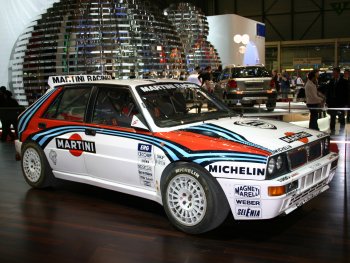
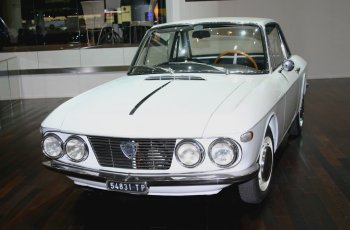
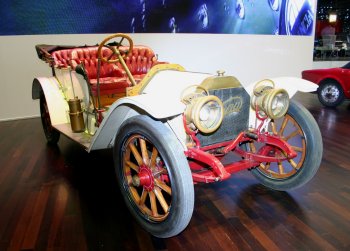 |
|
In keeping with the ‘vintage’ context of the stand,
Lancia is also exhibiting four extraordinary
historical cars which recall four important moments
in the brand’s long and glorious history: a Beta
Torpedo 15 HP, an Aurelia GT B24 Spider, a Fulvia
Coupé 1.2 (first series) and a Delta HF integrale
EVO Martini gr.4.. |
|
 |
|
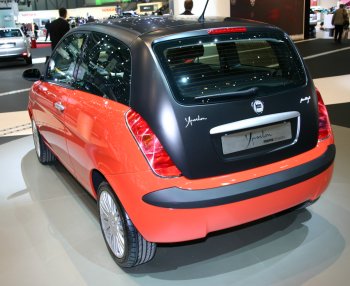
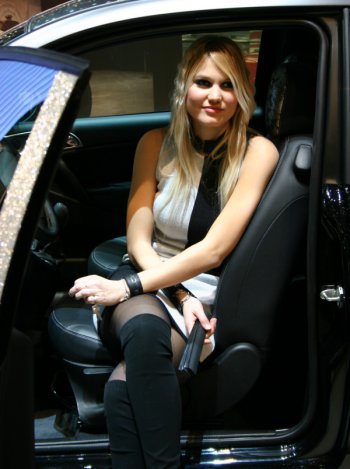
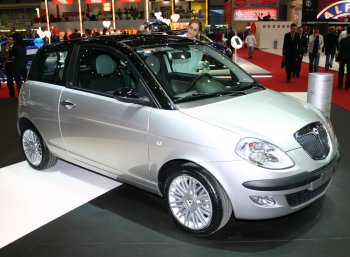 |
|
The Geneva stand celebrates the brand’s 100 years of
history with an evocative display, mixing historical
cars with new versions from today’s range, and
projecting period films and advertisements for the
latest models on the screens. |
|
 |
|
|
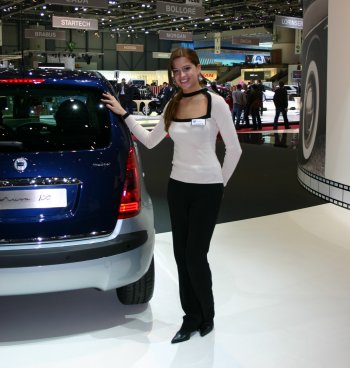 |
|
The 76th Geneva Motor Shows officially inaugurates
the celebrations for Lancia’s centenary. It is an
extraordinary milestone, shared with only a small
number of carmakers, for which the brand has created
a stand on which the worlds of design, fashion and
the cinema coexist, three contexts in which the
brand will be present this year with important
initiatives to mark its Centenary. |
|
 |
|
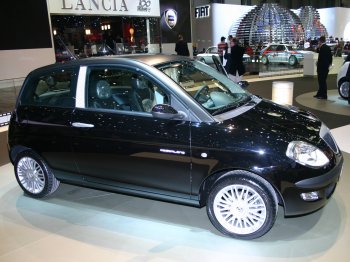
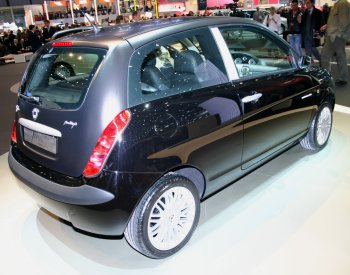 |
|
The Lancia Ypsilon Moda Milano is a haute couture
outfit, designed by the Lancia Styling Centre and a
team of fashion stylists, and developed with the
collaboration of Alcantara, Crystal Label and AT+T.
A unique product with a daring look, which could
have other developments in the future. |
|
 |
|
|
From the revolutionary 1.3 Multijet engines
(described as the ‘engine of 2005’), to the innovative DFN
gearbox, huge Gran Luce sunroof and Bose stereo system.
Both models sport the original Centenary logo: the number 1
followed by ‘∞’ which recalls both a double zero and the
symbol of infinity. A strong symbol that embraces the past,
the present and the future, because celebrating a century of
life is not a nostalgic re-evocation, but a departure
towards new challenges; this is the concept conveyed by the
stand in Geneva, which is packed full of novelties but also
‘proudly’ evocative.
Two-tone paintwork, a feature of great cars of the past, now
returns on the latest Lancia models thanks to a special long
painting process: Lancia offers what was once an ‘artisan’
feature available to a chosen few, on its ‘pocket
flagships’, the Musa and Ypsilon. Thanks to the heritage of
values that are part of its genes, Lancia is in a better
position than most to respond to the needs of a clientele
looking for high technology but also aware of the value of
tradition, who want ‘substance’ from their cars, but also
exclusiveness and prestige.
The equation ‘elegance and innovation’ is epitomised by the
Lancia Thesis, the flagship in which Lancia interprets the
theme of the large, prestigious saloon. The brand’s
‘chromosomes’ are typically Italian craftsmanship, and the
capacity to give a new look to the most advanced
technologies. For example, in the well-being that is
guaranteed by quality materials used not only for their
stylistic effect but also for the sensory pleasure they
impart. Or in a more advanced approach to information and
telematic technology, which enables the Lancia Thesis to
satisfy occupants’ desires immediately by adapting to the
motorist and not the other way round.
The Lancia Thesis addresses the most demanding market
bracket, customers who want complete control of the comfort
and onboard activities even when they are not driving: from
the layout of the interior space to the climate, the use of
instruments to communicate with the outside world, and
access to the media, whether for work or for pleasure.
Visitors to the Geneva stand can admire the latest version
of this model, equipped with a new 185 bhp 2.4 Multijet
engine, with new, even more refined interiors and original
exterior features.
In keeping with the ‘vintage’ context of the stand, Lancia
is also exhibiting four extraordinary historical cars which
recall four important moments in the brand’s long and
glorious history: a Beta Torpedo 15 HP, an Aurelia GT B24
Spider, a Fulvia Coupé 1.2 (first series) and a Delta HF
integrale EVO Martini gr.4. These cars have been
immortalised by Fulvio Bonavia, one of the most famous
Italian photographers, who created the calendar ‘1906-2006:
Once upon a time …’ in which a century of automotive
creations from Lancia are combined with ‘fairy-tale
inventions’.
Still on the theme of ‘cinema and fashion’, which runs
through the Lancia stand, in one area films and design items
recall the years of the ‘Dolce Vita’, when Federico
Fellini’s ‘paparazzi’ were the stars of wild Roman nights,
ready to ‘steal’ pictures, stories and sensations to sell to
the press. It was the late Fifties and Rome was the capital
of the cinema and the international jet set: Via Veneto came
alive, the chic bars and luxury hotels were full of actors
and writers, while politicians and VIPs met at the tables of
the ‘in’ places. A kaleidoscope of language and music,
perfume and colour. And the legendary Lancia Aurelia B24
driven by Vittorio Gassman raced across the cinema screens
in Dino Risi’s film ‘Il Sorpasso’ (1962). The 1950s were
also an unrepeatable moment for motoring history. Lancia was
undisputed leader among the carmakers for the class,
elegance and sporty nature of its models. They were called
the Ardea, Aurelia and Appia, and they sped down the roads
of Europe with style, refinement and sensuality, like
primadonnas of the cinema.
But the years of the ‘Dolce Vita’ were also the years in
which Italian fashion began to make a name for itself in the
world. What we now call ‘Italian Glamour’ was born in those
years, when the aesthetics of daily life, quality food and
wine, good taste, imagination and ‘savoir-vivre’ began to
take hold. But above all class, charm and elegance. That
Italian elegance which is the foundation and hallmark of the
Lancia philosophy, and which we can find in its most recent
creations.
The best example of the ‘Italian art of living’ is the
Lancia Phedra Emblema, which is on show in Geneva in a
6-seater version equipped with the powerful 128 bhp 2.2 JTD
engine. Standing next to the two ‘Centenary’ models, the
prestigious people-mover is ‘dressed’ in elegant,
sophisticated Rossini Grey, which is set off perfectly by
beige leather upholstery inside. The model has a muted
interior environment, which is a pleasure to look at and
touch, with every detail perfectly finished, to produce a
companionable ambience, protected by an array of safety
equipment (in 2004 the car received the 5-star Euro NCAP
rating), and the best comfort and telematic features in its
segment.
Plenty of comfort and stylistic refinement, but
also class-beating performance delivered by the engines: a
108 bhp 2.0 JTD 16v (available with hydraulic automatic
transmission) and a 128 bhp 2.2 JTD 16v, a particularly
brilliant turbodiesel that guarantees an entertaining drive
in all situations, combined with low running costs.
|
|
|
|
![]()
![]()